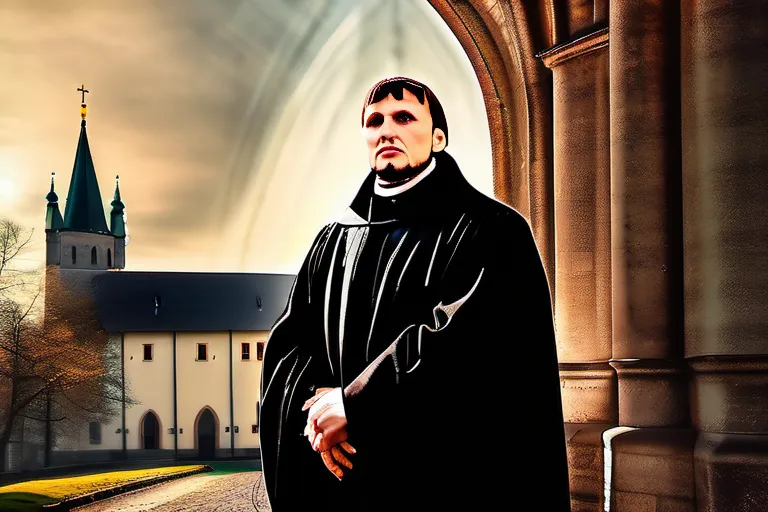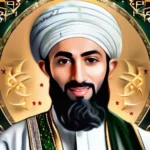Explore the life, beliefs, and impact of Martin Luther, the German monk who sparked the Protestant Reformation.
Martin Luther was a key figure in the Protestant Reformation, a religious and political upheaval that forever changed Europe. Born in 1483, Luther’s life was marked by a deep faith, a burning desire for reform, and a willingness to challenge the established Church.
Early Life and Education
Who was Martin Luther? A question that has echoed through time, drawing us back to the early life and education of this pivotal figure in history. Born into a family of miners in 1483, Luther found himself rooted not only in the earth but also in a world of knowledge and faith. His father, Hans Luther, was a hardworking miner who dreamed for his son a better life than his own. Little did he know that his boy would one day challenge the very foundations of the Church.
The early years of Luther‘s education were marked by a rigorous and sometimes harsh regimen. He attended primary school in nearby Mansfeld, where discipline was strict and intellectual curiosity was encouraged. It was during these formative experiences that he developed a love for learning that would shape his future choices.
But it wasn’t just the academic environment that influenced Luther; it was also the spiritual landscape of his youth. Growing up in a time when superstitions and religious fears were rampant, he found solace in books and began to question the doctrines he had been taught. One particularly memorable moment during his teenage years involved an intense storm. Standing in awe under the thunderous skies, Luther felt a profound connection with God, an experience that would stay with him throughout his life.
The path from miner’s son to scholarly monk was not straightforward. After completing his education at the University of Erfurt, Luther faced a pivotal decision: to enter the monastic life or pursue a secular career. His choice to take up monastic vows was driven by both spiritual and familial pressures. Little did he know that his vow would set in motion a chain reaction that would change not just his own path but the course of history.
Thus, we see that the early years of Martin Luther were a blend of hardship, intellectual curiosity, and spiritual awakening. These formative experiences laid the groundwork for the man who would challenge the Church with bold words and actions. Who was this young monk whose early life set him on a path to become one of history’s most influential figures? The answer lies in exploring his journey from mining town to the center of controversy.
The Indulgence Controversy
Imagine a world where money was literally sprinkled like holy dust, granting forgiveness from sins and ensuring a quick passage to heaven. That’s what indulgences were in 16th-century Europe, and for Martin Luther, it was a spark that ignited a revolution. How could selling the promise of salvation be considered anything but scandalous? Wasn’t the Church supposed to be about redemption through faith alone?
In 1517, Pope Leo X authorized Johann Tetzel, a Dominican friar and salesman extraordinaire, to preach indulgences in Germany. Luther’s parishioners were buying these indulgences left and right, with promises of remission from the temporal punishment due to sin. Yet, as Luther pondered the theological implications, he felt a profound contradiction between what the Church taught and what Scripture said.
Wasn’t salvation meant to be free? Why should it come with a price tag? These questions gnawed at him until they became an obsession. He wrote down his concerns, and on October 31, he nailed his Ninety-five Theses to the door of All Saints’ Church in Wittenberg—a bold act that marked the beginning of a seismic shift.
The controversy surrounding indulgences was not just about money; it was about power and control. The Church argued that only through these indulgences could one’s sins be forgiven, and this belief was central to their financial and spiritual authority. But for Luther, the true path lay elsewhere—beyond the realm of earthly riches and into the heart of God.
So who was Martin Luther? In his relentless pursuit of truth, he challenged the very foundations of the Church, setting in motion a chain reaction that would change history forever. Was it a reckless act or a divine calling? The answer lies not just in the actions themselves but in the profound impact they had on the world.
The indulgence controversy was more than just a theological dispute; it was a catalyst for the Protestant Reformation, a movement that sought to purify the Church and restore its original teachings. For Luther, it was a journey from darkness into light—a journey that would forever alter the course of religious history.
The Ninety-five Theses and the Reformation
The Ninety-Five Theses and the Reformation: Have you ever wondered how one piece of paper could change the course of history? For Martin Luther, it was a simple act that set off a chain reaction leading to the Protestant Reformation. On October 31, 1517, he nailed his Ninety-Five Theses to the door of All Saints’ Church in Wittenberg, Germany. But what exactly did this document contain, and why was it so revolutionary?
The Ninety-Five Theses were a series of academic debates on the sale of indulgences, but their impact went far beyond just theological arguments. Luther’s primary concern was the corrupt practice of selling indulgences, which he saw as exploiting people’s faith for financial gain. He questioned whether purchasing these documents could actually absolve one from sin, challenging a core aspect of Catholic doctrine.
Imagine, if you will, a giant domino effect. Each thesis challenged a different aspect of the Church’s teachings and practices, setting up a perfect storm of debate and controversy. Luther’s words were not just theoretical; they were a call to action for reform within the Church. His arguments resonated with people across Europe, who began to question their own faith and the authority of the Catholic Church.
But why did his ideas spread so quickly? The invention of the printing press played a crucial role in disseminating Luther’s thoughts far and wide. Unlike the days of handwritten manuscripts, printed copies could be distributed easily and read by many. It was as if a spark ignited a forest fire, with people eager to share and discuss these new ideas.
The Ninety-Five Theses were more than just a series of arguments; they were a manifesto for change. They challenged the very heart of the Church’s authority and began a movement that would eventually split Christendom into multiple denominations. Luther’s bold step was not just academic but also revolutionary, setting in motion events that would shape the future of Christianity.
So, as you reflect on these events, consider this: what single action could spark such profound change? The Ninety-Five Theses were a pivotal moment, a turning point that reshaped history. And for Martin Luther, it was a moment of both great peril and incredible opportunity to transform the religious landscape of Europe.
Luther’s Trial and Excommunication
Imagine Martin Luther standing before the Church, his fate hanging by a thread. The trial was not just a legal proceeding but a public spectacle, a stage where centuries-old beliefs were put to the test. How could a simple monk from Wittenberg challenge the mighty edifice of the Catholic Church? Luther’s excommunication on January 3, 1521, marked a turning point in history. Was it a moment of triumph or despair for Luther? The Pope’s declaration was like a bolt of lightning, jolting the Church and the faithful alike.
The political and religious turmoil that followed was akin to a tidal wave. ‘How could one man’s defiance ripple so far?’ asked contemporaries. Governments across Europe had to choose sides: support Luther or stand firm with the Church? The divide hardened lines, splitting families, communities, and even kingdoms in half. In many ways, Luther’s excommunication was a pivotal moment, not just for him but for all of Christendom.
The reaction to Luther’s excommunication was swift and decisive. Pro-Lutheran cities declared their allegiance openly, while the Elector Frederick of Saxony protected his protégé. Meanwhile, the Church rallied its forces, sending envoys to silence the heretic. But Luther was no ordinary man; he had a powerful ally in the printing press, which spread his message far and wide. The Reformation was on a collision course with tradition, and the path ahead seemed uncertain but full of promise.
As the smoke of excommunication cleared, it became evident that Martin Luther’s life and work were about to transform not just the Christian world but society as a whole. Would the Church ever be the same? And what new paths might open for believers seeking spiritual freedom?
The excommunication was a trial that shaped more than just Luther’s destiny; it reshaped the very fabric of European society, setting in motion changes that would echo through the centuries. How could anyone have foreseen such seismic shifts from a single act of defiance? The question lingers: Was Martin Luther’s trial and excommunication a fleeting moment or the dawn of a new era?
The Diet of Worms and Aftermath
In the spring of 1521, Martin Luther stood before the eyes of history at the Diet of Worms, a pivotal moment that would either quash his burgeoning movement or propel it to new heights. The Diet of Worms was more than just a gathering; it was a stage where political and religious powerhouses clashed in the crucible of Luther’s fate.
The atmosphere was charged with tension, like the calm before a storm. Would Luther, the voice against the status quo, stand firm or back down? The question hung heavy in the air, waiting for its answer. As he stepped forward to address the assembled nobles and clergy, Luther faced a daunting challenge. He had been summoned by Charles V, Holy Roman Emperor, but his stance was unwavering. ‘I cannot nor will I recant anything,’ he declared, echoing the resolute spirit of a lion in the face of a storm.
The consequences for Luther were dire, yet they set into motion a chain reaction that would reshape European history. His refusal to recant, marked by his famous ‘Here I stand; I can do no other’ declaration, was as bold as it was defiant. It was not just a personal stance but a statement of principle, a beacon of light in the darkness of religious uniformity.
The spread of the Reformation across Europe began almost immediately after Luther’s stand at Worms. Like wildfire spreading through dry brush, ideas that had long been smoldering now ignited into action. The German-speaking territories were the first to catch this flame, but it quickly leaped boundaries and languages, touching the hearts and minds of people far beyond the borders of Germany.
The Reformation’s impact was profound, not just in religious terms but also in political and social spheres. It challenged the very foundations of medieval European society, shaking the power structures that had endured for centuries. The spread of Luther’s teachings was like a river carving its path through solid rock, slowly but surely altering the landscape.
The aftermath at Worms was not just about Luther; it was about the birth of a new era in which individuals could question and challenge authority in unprecedented ways. This event marked the beginning of a journey that would lead to the Enlightenment and beyond, where individual freedom and thought were paramount.
Luther’s Legacy and Influence
Have you ever wondered how one person could have such a profound impact on history? Martin Luther, a German monk and professor at Wittenberg University, sparked a revolution that would shake the very foundations of Christianity and Western thought. The consequences of his actions reverberate through time, shaping not only religious beliefs but also the very fabric of modern society.
Imagine a ship tossed about in turbulent waters; that is what Europe was like when Luther nailed his famous Ninety-Five Theses to the door of All Saints’ Church in Wittenberg. This act set off a chain reaction, much like throwing a stone into a lake. The ripples spread far and wide, challenging the authority of the Roman Catholic Church and giving birth to Protestantism.
Luther’s teachings were not just academic; they were revolutionary. He questioned the sale of indulgences, which he saw as a corrupt practice that profited the Church at the expense of the faithful. His message was clear: salvation came through faith alone, not through good works or the purchase of indulgences. This belief, encapsulated in his famous phrase salus sola fide, or ‘salvation by faith alone,’ transformed Christianity and set the stage for a new era.
The impact of Luther’s teachings extended beyond religious boundaries. He believed that every Christian had the right to interpret the Bible directly, without the need for a hierarchical Church structure. This democratization of knowledge laid the groundwork for modern concepts such as individualism and personal freedom. In essence, he was advocating for a more direct line between God and the believer, much like the internet has given us access to information in today’s world.
However, Luther’s legacy is not without controversy. His writings on race and slavery, which later critics have pointed out as problematic, cast a shadow over his otherwise progressive ideas. But then again, who among us can claim perfection? The key lies in how we choose to interpret and apply the teachings of those who came before us.
As we reflect on Luther’s life and legacy, it is impossible not to wonder about the power of individual action and the potential for one person to change the course of history. Martin Luther was more than just a reformer; he was a catalyst for change, a voice in the wilderness that challenged the status quo and opened up new possibilities. His impact on Christianity, Western thought, and the modern world is immeasurable, and his story continues to inspire and challenge us today.
Conclusion
 Luther’s actions set in motion a series of events that would reshape Christianity and leave an indelible mark on history. His legacy continues to inspire and challenge us today.
Luther’s actions set in motion a series of events that would reshape Christianity and leave an indelible mark on history. His legacy continues to inspire and challenge us today.











